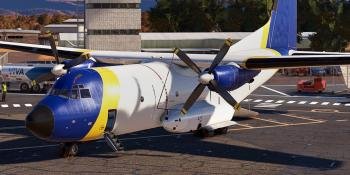FedEx Express Airlines has received the production ATR 72-600 Freighter. Mark Broadbent examines the new variant and considers the long-term prospects for the manufacturer’s aircraft and the wider turboprops market
Freighter conversion programmes for ATR turboprop airliners have been possible from the manufacturer and third-party conversion specialists for many years, but the ATR 72-600 Freighter is the first production model to be made available. The initial ATR 72-600F, EI-GUL (c/n 1653), was handed over to FedEx Express on December 15 last year, the first in a firm order for 30 examples, plus options for 20 more, placed by the freight giant at the time of the model’s launch in 2017.
Cargo upswing
No one could have predicted the increase in demand for air cargo in 2020 due to the COVID-19 crisis. The global pandemic resulted in a huge number of emergency flights to transport medical supplies and equipment around the world, as well as greater e-commerce activity from consumers locked down at home.
Orders grew for passenger aircraft conversions to cargo use offered by third-party specialists such as Aeronautical Engineers Inc (AEI) and the Airbus/EFW joint venture, while supplementary type certificates…



